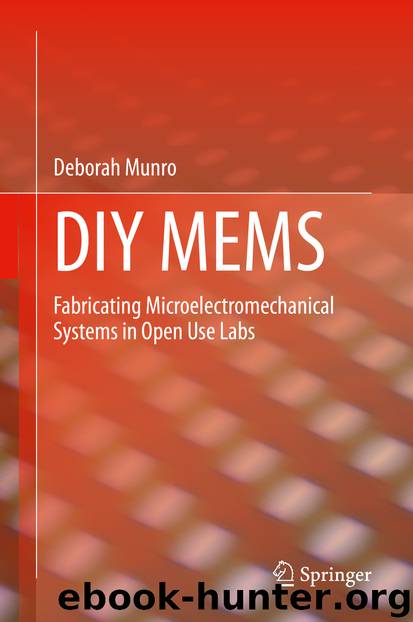DIY MEMS by Deborah Munro

Author:Deborah Munro
Language: eng
Format: epub
ISBN: 9783030330736
Publisher: Springer International Publishing
FDA
If you want to market your medical device in the United States, you need to obtain clearance from the FDA. This clearance is obtained from the FDA via a 510(k) submission, also known as premarket notification. Nearly all Class II (medium-risk) devices, as well as a small number of Class I (low-risk) and a few Class III (high-risk) devices, go through the 510(k) process. Most Class III devices, however, obtain market approval via the premarket approval (PMA) process, which is significantly more strenuous than the 510(k).
For the MEMS device that are the subject of this book, you may have questions about which class your device falls into, along with numerous other questions that cannot be answered without some expert assistance.
In a white paper released by Emergo, a medical device consulting firm (https://www.emergobyul.com/services/united-states), they discuss when to contact the FDA about a new device. The FDA is a huge organization, and whether you are a small start-up company developing your first device or a large corporation with lots of experience, it can be intimidating to communicate with the FDA.
There is no right or wrong time to contact the FDA. Part of their mission statement is to “facilitate medical device innovation by advancing regulatory science, providing industry with predictable, consistent, transparent, and efficient regulatory pathways,” and the FDA is populated by real people with real expertise who want to help you. On the other hand, although it is always “better to be safe than sorry,” you should also know that a record is being made by the FDA of all your communications and advice/recommendations you have received. When you do submit your application, some of those recommendations may come back to haunt you, so wait long enough before initiating communication that you have a clear idea of what your final device is likely to be so that you avoid unnecessarily raising concerns that will become obsolete or irrelevant.
Whenever you have a question to which you cannot find an adequate answer, you can contact the FDA, but do your research first and take advantage of the numerous databases and online information available to you before picking up the phone.
Even when you may think you have all the answers, there are times when it makes sense to obtain FDA’s guidance. Emergo suggests some examples of scenarios that should prompt contact with the FDA:Early in the development of a novel device or combination product to ensure the correct classification
Download
This site does not store any files on its server. We only index and link to content provided by other sites. Please contact the content providers to delete copyright contents if any and email us, we'll remove relevant links or contents immediately.
Whiskies Galore by Ian Buxton(42015)
Introduction to Aircraft Design (Cambridge Aerospace Series) by John P. Fielding(33128)
Small Unmanned Fixed-wing Aircraft Design by Andrew J. Keane Andras Sobester James P. Scanlan & András Sóbester & James P. Scanlan(32800)
Craft Beer for the Homebrewer by Michael Agnew(18245)
Turbulence by E. J. Noyes(8050)
The Complete Stick Figure Physics Tutorials by Allen Sarah(7373)
The Thirst by Nesbo Jo(6944)
Kaplan MCAT General Chemistry Review by Kaplan(6933)
Bad Blood by John Carreyrou(6622)
Modelling of Convective Heat and Mass Transfer in Rotating Flows by Igor V. Shevchuk(6440)
Learning SQL by Alan Beaulieu(6291)
Weapons of Math Destruction by Cathy O'Neil(6281)
Man-made Catastrophes and Risk Information Concealment by Dmitry Chernov & Didier Sornette(6019)
Digital Minimalism by Cal Newport;(5765)
Life 3.0: Being Human in the Age of Artificial Intelligence by Tegmark Max(5558)
iGen by Jean M. Twenge(5416)
Secrets of Antigravity Propulsion: Tesla, UFOs, and Classified Aerospace Technology by Ph.D. Paul A. Laviolette(5371)
Design of Trajectory Optimization Approach for Space Maneuver Vehicle Skip Entry Problems by Runqi Chai & Al Savvaris & Antonios Tsourdos & Senchun Chai(5068)
Pale Blue Dot by Carl Sagan(5008)
